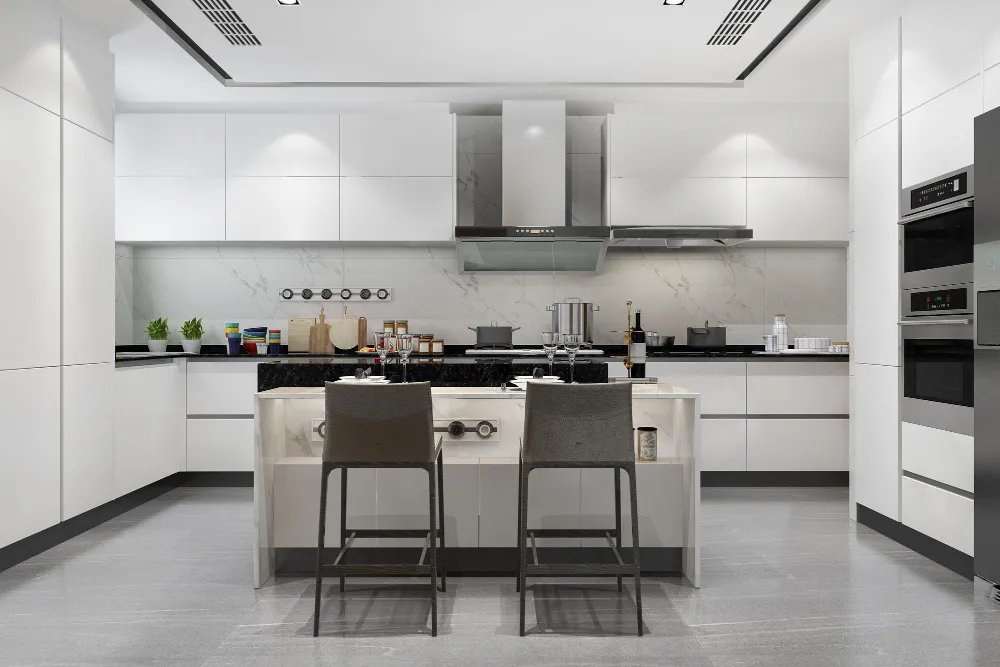Understanding Kitchen Cabinets

A kitchen is more than just a space for cooking; it’s the heart of the home, where meals are prepared, and memories are made. One of the most important elements that contribute to a kitchen’s functionality and aesthetic appeal is the kitchen cabinet. Kitchen cabinets are not a new concept; they are an essential and enduring part of kitchen design, providing storage, organization, and style.
Kitchen cabinets are built-in furniture installed in kitchens to store food, cooking equipment, and often silverware and dishes for table service. They are typically made of wood, plywood, or MDF and come in a variety of styles, finishes, and configurations to suit different kitchen layouts and design preferences.
In every well-designed kitchen, you’ll find a variety of cabinets that cater to different storage needs. These cabinets help keep your kitchen organized, ensuring that everything from spices to pots and pans has its place. Beyond functionality, kitchen cabinets also play a significant role in defining the look and feel of your kitchen, making them a crucial component in any kitchen design.
Whether you’re building a new kitchen or renovating an existing one, choosing the right kitchen cabinets is essential for creating a space that is both beautiful and practical. Let’s explore the key aspects of kitchen cabinets, from their functions and importance to the different types available and how to choose the best options for your Nigerian kitchen.
Functions of Kitchen Cabinets
The primary function of kitchen cabinets is storage. They provide a designated place for storing kitchen essentials like dishes, cookware, utensils, and pantry items, keeping your kitchen organized and clutter-free. Additionally, kitchen cabinets help protect your items from dust and damage, ensuring they are easily accessible when needed.
Why You Need Kitchen Cabinets
Kitchen cabinets are essential for maintaining an organized and efficient kitchen. Without proper storage, your kitchen can quickly become cluttered and chaotic, making it difficult to find what you need when cooking. Cabinets not only help you keep everything in its place but also contribute to the overall cleanliness and safety of your kitchen by reducing clutter and hiding potentially hazardous items like sharp knives and cleaning supplies.
The Role of Kitchen Cabinets in a Nigerian Kitchen
In Nigerian kitchens, where space can sometimes be limited, kitchen cabinets play a vital role in maximizing available space. They provide ample storage for the diverse range of ingredients and utensils commonly used in Nigerian cooking. Additionally, well-designed cabinets enhance the kitchen’s aesthetic appeal, making it a more inviting space for both cooking and socializing.
The Importance of Kitchen Cabinets in the Nigerian Kitchen
The importance of kitchen cabinets in a Nigerian kitchen cannot be overstated. They are crucial for creating an organized, functional, and visually pleasing kitchen environment. By providing a place for everything, cabinets help streamline the cooking process, making it easier and more enjoyable to prepare meals. Moreover, cabinets can significantly impact the overall design and resale value of your home, making them a worthwhile investment.
Types of Kitchen Cabinets
There are various types of kitchen cabinets to consider, each designed to meet different needs and preferences:
- Base Cabinets: These are the cabinets that sit on the floor and support the countertop. They provide substantial storage space and often include drawers and shelves for easy access to pots, pans, and other large items.
- Wall Cabinets: Mounted on the wall, these cabinets are perfect for storing dishes, glassware, and other items you need within easy reach. They help free up counter space, making your kitchen more efficient.
- Tall Cabinets: Also known as pantry cabinets, these tall units are ideal for storing bulk food items, small appliances, and cleaning supplies. They maximize vertical space and can be customized with pull-out shelves and baskets.
- Corner Cabinets: Designed to make the most of corner spaces, these cabinets often include rotating shelves or lazy Susans to provide easy access to items stored deep inside.
- Glass-Front Cabinets: These cabinets have glass doors, allowing you to display your favorite dishes or glassware while keeping them protected. They add a decorative element to your kitchen while also serving a practical purpose.
For the best selection of kitchen cabinets in Nigeria, afess.ng offers a wide range of high-quality options that can be customized to fit your kitchen’s needs and style.
Installation of Kitchen Cabinets
Proper installation of kitchen cabinets is crucial for ensuring they are secure and function correctly. It’s important to hire professionals who can measure your space accurately, align the cabinets properly, and secure them to the walls and floors. Proper installation not only enhances the durability of your cabinets but also ensures that your kitchen remains safe and functional.
Maintenance of Kitchen Cabinets
Regular maintenance of your kitchen cabinets is essential to keep them looking and performing their best. This includes cleaning the surfaces with a mild detergent, checking for any loose hinges or handles, and making necessary repairs. For wooden cabinets, periodic polishing can help maintain their finish and extend their lifespan.
Conclusion
Kitchen cabinets are the backbone of any functional kitchen, providing essential storage and contributing to the overall design and efficiency of the space. Whether you’re outfitting a new kitchen or upgrading an existing one, investing in high-quality kitchen cabinets from afess.ng is a smart choice. With proper installation and regular maintenance, your cabinets will serve you well for years to come, making your kitchen a more organized, beautiful, and enjoyable place to be.